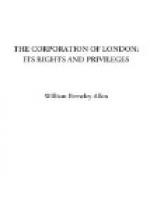The Aldermen.
Among the Anglo-Saxons the title of alderman was regarded as one of the most honourable distinctions to which a freeman could aspire. After a time, however, it was conferred with somewhat too liberal courtesy on nearly every individual vested with authority. The presidents of district guilds were especially known by this designation, which they afterwards monopolized when the guilds became raised into wards or hundreds of the city. The aldermen then partially recovered their former dignity, and in the charter of Henry I. are mentioned as barons. The position and authority of an alderman, though they have much declined since the olden times, are still a reasonable object of ambition. He is a justice of the peace, as well as the presiding officer of his ward, and, by virtue of his office, a member of the Court of Common Council; but it is rather in their collective than their individual capacity that their power and usefulness are most conspicuous. Independently of their judicial duties, the Court of Aldermen constitute the executive department of the Corporation; with them rests the cognizance of the return of every civic officer elected at a wardmote court, and also of the election of common-councillors. They swear in brokers and other officers, and investigate the validity of claims to civic freedom. For the proper discharge of these and similar duties, they are singularly adapted through their local knowledge, which is likewise of material service to her Majesty’s judges at the Central Criminal Court. This circumstance further renders them most efficient as city magistrates,—far more so, indeed, than any police or stipendiary magistrate could ever hope to be. Personally acquainted with the inhabitants of their respective wards, they are in a position to obtain peculiar and authentic information as to the characters, habits, and motives of witnesses, accusers, and accused. Their devotion to public business is wholly disinterested, for there are no pecuniary emoluments attached to the office, which has truly little to recommend it, save as being a sphere of active utility, and as a gratifying token of the good-will of one’s fellow-citizens. The proper style of the Court is the “Court of the Mayor and Aldermen in the Inner Chamber.” It consists of the Lord Mayor or his deputy—an alderman who has passed the chair—and not less than twelve other aldermen. The proceedings of the Court are entered in journals called “Repertories,” which are kept in the muniment-room. The Recorder, the Steward of Southwark, the Clerk to the Lord Mayor, the keepers, governors, chaplains, and surgeons of the different prisons, and other officers of the Corporation, are elected by this Court, which, for assiduity, intelligence, and incorruptibility, yields to no body of men in the kingdom.
Court of Common Council.




